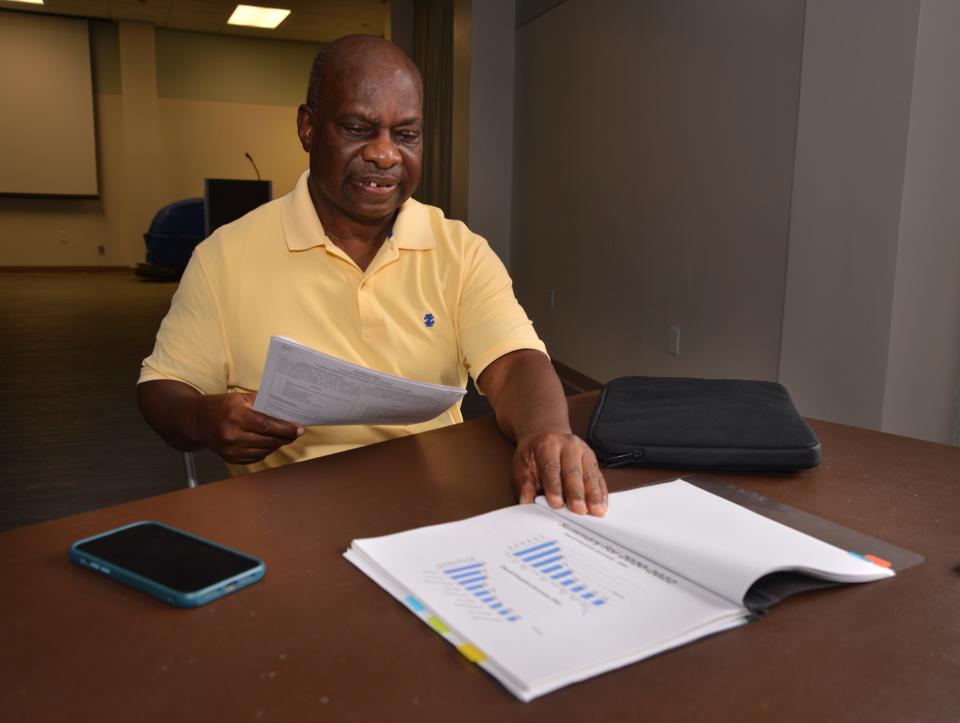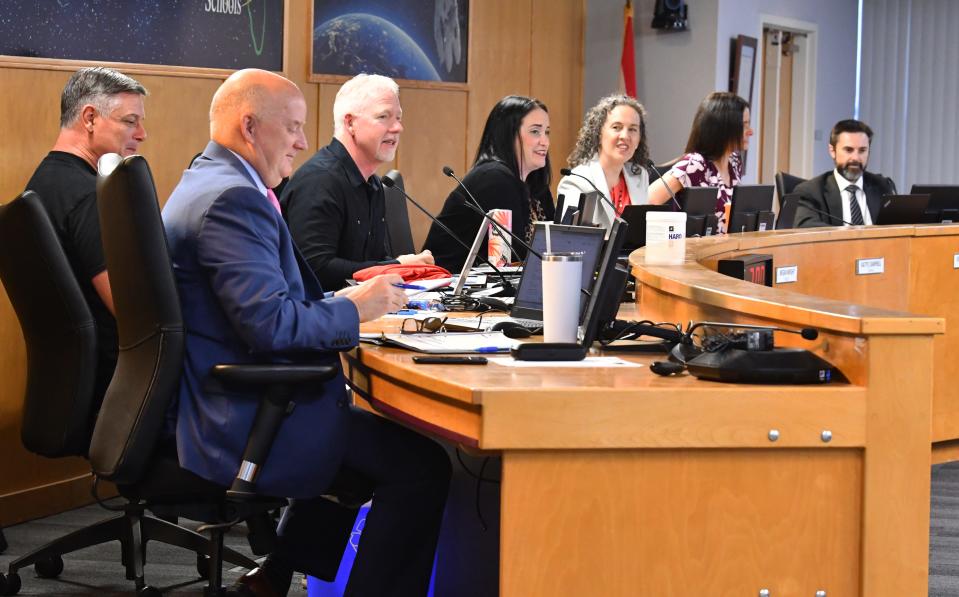'Bad data with no plan': Discipline rates against Black students remain steady in Brevard
Black students in Brevard have suffered disproportionate rates of discipline for at least 11 years, and recent rates haven't improved much.
Brevard has collected data from three separate points this year regarding discipline rates. This comes after promises from Brevard school board member Matt Susin of an overhaul to disciplinary procedures, as well as a March 2023 audit that suggested creating a centralized discipline office to reduce confusion when entering discipline referrals — a recommendation that has gone ignored.
Compared to last year, the first set of data showed a significant jump in disciplinary referrals — something Susin said was due to staff being better trained on how to record discipline referrals.
As of the first week of April, data for all disciplinary referrals for the 2023-2024 school year had not been released to the public. But the most recent data, initially presented by student services at a BPS Minority and BIPOC Community Leader meeting on April 3, showed that out-of-school suspensions among Black students had dropped by only a tiny percentage compared to all other races and categories.
The lack of change was met with frustration by community members like William "Bill" Gary, president of North Brevard NAACP.
"We don't really see any movement in terms of any proposals of programs and/or training that would help alleviate the problem," said Gary, who in 2013 filed a complaint with the U.S. Department of Education about Brevard Public Schools' disproportionate rates of discipline of Black students; the closure of multiple schools that served predominantly Black students; and the district's practices related to hiring and promoting Black teachers.
That complaint has remained unanswered.
What the data shows
The rate of discipline is marked with a risk ratio. The ideal number is to get every group to one, meaning everyone is at the same risk of being disciplined. A risk ratio of 2.5 is an "alert status," while a 3.0 is when action needs to take place, according to Chris Reed, director of student services. Anything under 1.0 means that population is receiving fewer referrals compared to other demographics.

Initial complaint remains unanswered: Years after a racial inequities complaint was filed against Brevard Schools, questions linger
Second quarter data: Discipline trends still show disproportionate rates for Black Brevard students in 2023-'24
The state department of education uses the risk ratio numbers to determine if a district is "at risk" based on the number of suspensions within a given population.
In the third quarter of the year, only two groups were marked as "at risk": students on free or reduced lunches, and Black students. These numbers had dropped from the second quarter, though only by a small fraction.
During the third quarter, students on free or reduced lunches had a risk ratio of 2.68 compared to 2.75 during the second quarter, while Black students had a third-quarter risk ratio of 2.52 compared to a risk ratio of 2.57 during the second quarter.
Initial data presented had been calculated erroneously and showed that the most recent risk ratios for these groups were 2.86 for students on free or reduced lunches and 2.97 for Black students, though the corrected numbers were sent to meeting attendees on April 5.
White, Hispanic, Asian and English language learner students all had risk ratios below 1.0, meaning they were at a below-average risk of being disciplined.
Brevard Public Schools clarified that incorrect numbers had been presented at the meeting but did not provide further comment to FLORIDA TODAY.
'Bad data with no plan'
According to Gary, the No. 1 reason given at the meeting for the suspension of Black students was willful disobedience/insubordination. It's a reason he feels is too subjective, and a concern he's raised before.
"We had already agreed that, four or five years ago ... insubordination, (willful) disobedience is a subjective term," he said. "To one person, it means one thing; to another it means something else."
He added that the seeming lack of education given to teachers regarding how to apply discipline was frustrating and likely contributed to these disproportionate rates of discipline.
Bernard Bryan, education chair of South Brevard NAACP, called the information presented April 3 "bad data with no plan."
"To bring that information to the public without any root cause analysis is terrible," he said. "I would never, ever make a presentation that has a negative impact on a community without some type of plan."

The numbers were presented with a lack of data-driven solutions, he said. That's something that has been a repeated cause of contention for him with the district over the past several years, but especially this year, as the board has made repeated comments denying the possibility that teachers could be unconsciously biased toward Black students.
"Their assumption may be right, but you've got to go through the steps," he said. "That's what's been so frustrating to people who understand data."
At the meeting, the suggestion was made to provide students with more mentors, Bryan said. But without data showing that's what students need, he feels uncertain that will solve the issue.
'The district is really not serious about this at all'
Though the audit in March 2023 looked at Brevard's disciplinary practices compared to other Florida districts, as well as the types of incidents occurring in the district, Bryan felt it wasn't enough. And at the April 3 meeting, the suggestion was made to provide more mentors for students. Again, Bryan felt there wasn't data to back up the recommendation.

His advice: The district needs to hire an outside consultant to analyze data related to discipline and what's causing the disproportionate numbers, then proceed.
"(Providing mentors) may have a 1% impact," he said. "I'd never run my factory that way, because I don't want to misuse my assets (if it's) not going to give me the return on my investment."
As for Gary, he's still pursuing the complaint he made 11 years ago — this time seeking help from other sources outside the Department of Education.
"We are seeking assistance through other outside agencies to help us resolve this issue," he said, though he wasn't specific about what agencies those were.
In the meantime, he'll continue to attend community meetings and work with the district. It's something he cares deeply about, but often feels frustrated at the community meetings by the perceived lack of movement within the district.
"We don't even get into the meat of why we started those meetings," he said. "We leave there frustrated and with a feeling that the district is really not serious about this at all. It's just a Band-Aid to say that they are doing something, but the something is of little consequence."
Finch Walker is the education reporter at FLORIDA TODAY. Contact Walker at fwalker@floridatoday.com. X: @_finchwalker.
This article originally appeared on Florida Today: Civil rights activists frustrated with Brevard school discipline rates

